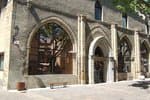Combe des Champannes loop
6 points of interest
 Fauna
FaunaCommon Perch
The Perch has a grey-green body with dark stripes. Its scales are rough. It has two dorsal fins, one of which has spiny rays. Its lower and caudal fins are orange. It can grow to around forty centimetres. It is a gregarious and opportunistic carnivore. It feeds on invertebrates and crayfish, but also hunts fish in organised packs. It is a chance for many novice anglers to get their first taste of carnivorous fishing.
. Fauna
FaunaThe fry
This is one of the most common 'white' fish. It has a spindle-shaped body, compressed laterally and covered with large silvery scales. Its lower fins and eyes are tinted red. Opportunistic, it eats both plants and tiny prey such as larvae and mosquitoes. It forms large shoals and most of the lake's anglers take their first steps on the water by catching them. Fauna
FaunaMallard
Not known to be shy, this dabbler prefers to feed on the surface or at shallow depths by moving forward with alternating circular strokes of its legs: it dips its head into the water and tilts forward. It nests on the banks of the Durance and is omnivorous, feeding on invertebrates, small fish and grasses... The male is easily recognisable during the breeding season by its bright green head. After this period, they moult and adopt a grey-brown colour close to that of the females and young.
 Fauna
FaunaGrass Carp
This fish takes its French name (Amour Blanc) from the river it originates in, the “Amur” River, which forms the border between China and Siberia. Its powerful body resembles that of the carp, but its low-set eyes are very different. The well-thought-out and reversible introduction of this species by the town of Embrun and the fishermen is a gentle, ecological and controlled way of solving the problem of plant proliferation in the Embrun water body. Fauna
FaunaYellow-legged Gull
It has travelled up the Durance and settled on the lake, where it finds propitious conditions for its survival (open water). This gull, a cousin of the seagulls, is omnivorous. The colony can be seen around the lake all year round. They are generally grey or white, with black markings on the wings. They have a long, thick beak and yellow webbed feet. The young are grey in colour and take two to four years to acquire adult plumage. Fauna
FaunaGreat Cormorant
Size: 90 cm
Description
- From the beach car park, head up the central path towards the Durance then turn right once on the banks to go alongside the lake. Then turn left onto the road after the yacht club reception. Follow the road until you reach the track. Follow the hairpin path up through the pines, following the trail. At the end of the forest, as the area opens up, the path turns into a carriageway and leads to the Departmental road linking Embrun to Puy-Sanières.
- Drive down the Departmental road then turn right after a few hundred metres. A single-track path winds its way down over the lake to the track used on the outward journey. Turn left onto the track just after passing under a small tunnel, then return along the same route.
- Departure : Lake Embrun
- Arrival : Lake Embrun
- Towns crossed : Embrun and Puy-Sanières
Altimetric profile
Information desks
Tourist office Embrun
Place Général Dosse - BP 49, 05202 Embrun
October to march : Monday to Saturday, 9.00 - 12.30 & 13.30 - 17.00.
April, may, june & september : Monday to Saturday, 9.00 - 12.30 & 14.30 - 18.00
July and August : Monday to Saturday, 9.00 - 19.00. Sundays, 10.00 - 12.30 & 16.00 - 19.00
On French national holidays (except 14th of July and 15th of August) : 9am to 1pm. Closed on the 1st of January, 1st of May, 25th December and 11th November
Closed on Thursdays outside French holidays’ periods
Access and parking
Parking :
Source

Report a problem or an error
If you have found an error on this page or if you have noticed any problems during your hike, please report them to us here:
